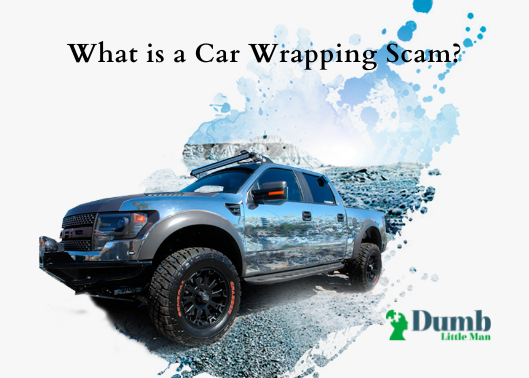What is a Car Wrapping Scam?
By Patrick Peterson
January 10, 2024 • Fact checked by Dumb Little Man

It seems reasonable that if your friends and coworkers can make money driving other people around for Uber and Lyft or delivering food for DoorDash or UberEats, you can use your vehicle to make money too. Just beware of car wrapping scams.
Car wrapping scams claim you can make up to $400-$600 per week just to drive normally with an advertisement plastered on your car. Scammers claim they represent nationally recognized companies and brands, but they don’t. The scams seek only to separate you from your money.
The Federal Trade Commission said that scams like this were reported 27,000 times in a recent year, with $28 million lost. Most of the victims were young people under the age of 30. Ignore ads you may see on Craigslist or on social media that say you can make money this way. If it’s too good to be true, it is.
How Do Car Wrapping Scams Work?
You may receive a solicitation on social media or see an ad on a job board that says it’s possible to make money driving around with an advertisement on your car. Why not try it? You’ve seen other vehicles covered in advertising, so other people must be making money doing it too.

The scam generally follows these steps:
- You apply and are contacted by an out-of-state phone number.
- You are instructed to provide sensitive personal information such as your birthdate, vehicle information, and bank account number (information you should never divulge).
- The caller says you will receive a check to deposit, and from that, you will pay for the wrap material.
- A check is mailed to you, and you deposit it in your account. It’s anywhere from $500 to $1,500.
- You’re given information about paying the person who will wrap your car. You forward them the money, which is most of the value of the check you received. The payment is usually made in a way that can’t be traced, such as a money order, gift cards, or direct deposit into a bank account.
- A week or more later your bank informs you that the check you deposited was fake, so your account balance is debited to the check amount. You could be overdrawn if you’ve already sent the required amount to the person doing the wrapping work.
How to Tell It’s a Scam
Common sense says if it were truly this easy to make money by putting advertising on your car, why isn’t every car covered in advertising? But scammers count on people who are going through the financial difficulty to try things like this scheme. It’s a trick that anyone of any age could fall for.
Other indications that this is a scam include:
- There is no proof that the contact person is affiliated with the national brand they say they represent.
- The constant pressure to act quickly, before you change your mind.
- The check is allegedly drawn on a small bank rather than cut from the national brand the scammer claims you will represent.
- The advertisement for the “job” is often full of spelling errors and awkward language.
- The unusual arrangement whereby you must pay the person performing the work out of money provided to you by a third party.
Representatives of national companies tell the Federal Trade Commission that they never hire people to wrap their vehicles with advertising.
What To Do When You’re a Victim
Nobody can blame you for trying to make money. Your bank and the authorities are likely to be sympathetic if you report being conned by this scam. Although it’s unlikely that your money will be refunded to you, you could do others a favor by telling your story, so they don’t fall for the same scam.
Take these steps:
- Contact the Federal Trade Commission at www.ftc.gov to register the incident.
- File a police report. Try to provide any relevant information such as phone numbers and names.
- If you provided any personal information such as your birthdate, social security number, or bank information, you might put alerts on your credit report and bank account. These can require permission for future transactions, like new credit cards or loans.
Conclusion
Scammers are all around us, every day, looking for a new angle to trick people out of their money. If we learned to stop and think about the promises they make and our reactions to their schemes, fewer people would be harmed. The car wrapping scheme is a new twist on the old scam of getting people to deposit fake checks. It’s tried millions of times each year in different contexts, from renting vacation homes to overpaying for an item sold on eBay.
A giveaway is that the scammer needs you to act quickly before you realize that the money isn’t in your account or before you get cold feet and back out of the scheme. When someone pressures you that way, it should make you wonder why. Perhaps if you take a moment away from the scammer’s phone calls and instructions, you will realize what’s happening and stop it before becoming the next victim.
Patrick Peterson
Patrick Peterson is a Content Manager at GoodCar. Born and raised in the automotive world, he’s an enthusiastic expert who writes exquisite content pieces about everything regarding cars and bikes.

